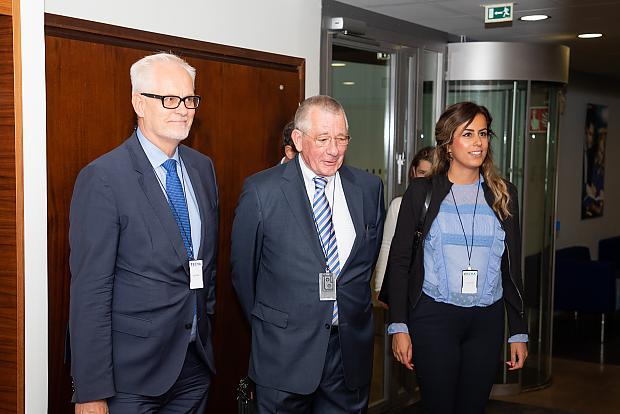Dutch government has power to ban toxic substances such as GenX
Dutch government has power to ban toxic substances such as GenX
On 18th September. SP Euro-MP Dennis de Jong and staff member Meltem Okcu paid a working visit to the European Chemicals Agency (ECHA) in Helsinki. The trip provided a treasure-trove of information concerning who gets to take the decisions when it comes to the use of chemical substances and in particular on the role of the industry itself. What prompted the visit was the widespread anger about the discharge of a dangerous substance, known by its brand name GenX, by chemical company Chemours in Dordrecht, Netherlands. The SP has fought on the local, regional and national level against this substance being omitted, which nevertheless turns out now to be present even in drinking water. Yet no action has been taken, despite the government having the power to restrict GenX and even to move to have a total ban instituted at European level. This would require them to be active in the responsible committee of the ECHA.

Photo: (ECHA) Dennis de Jong, MEP (centre) with Meltem Okcu (right) of the SP European Parliament staff.
Contrary to some media reports, no permission is required from the ECHA for GenX to be used. The procedures involved are complicated, but the fact that a chemical is registered with the ECHA, which is the case with GenX, is not the end of the story, but in reality merely the beginning. A member state – not the Netherlands – has already sounded the alarm and is urging a more detailed investigation into the damaging effects of GenX. If this study should reveal that the substance does indeed present a danger to public health or the environment, then its use can be restricted, or even, via a separate procedure, banned completely. So you might wonder what on earth the Dutch government is waiting for.
Industry plays a major role in ECHA, as companies must inform the agency of the substances they use. For all already familiar chemicals, the deadline for this was May 1st. This led to an enormous quantity of registration work, but it must be said that the workers at the Agency are enthusiastic and see how important it is to have regulations to protect public health and the environment. Moreover, it's the member states who determine whether or not a particular substance is dangerous or not, while ECHA takes care primarily of the collection of data and performs the necessary procedures. It is also better than the European Commission at ensuring that environmental and consumer organisations are properly represented in the work. The rules against conflicts of interest are strict, far more so than those operating at the Commission.
Findings during the working visit will of course play a role in further actions by the SP against GenX and similar toxic substances. De Jong also intends to bring the matter up at the annual budgetary control, and was pleased to hear that ECHA itself wants to end the registration fees which industry pays. As De Jong has advocated in the past, it would be better if these went to the Commission, releasing Agencies from fixed subsidies, which would benefit their independence. The rules on transparency and conflicts of interest employed by ECHA, moreover, provide a good example for other EU institutions. Our health and our environment are too important to be left to private companies. Effective independent control is essential.
